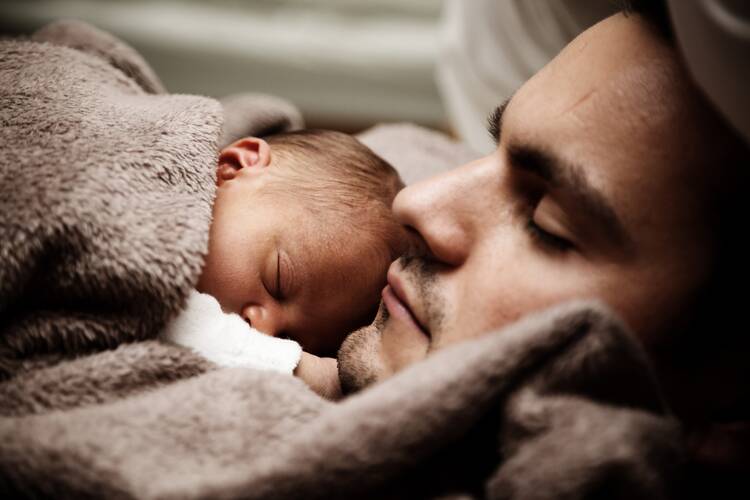A Reflection for the Third Thursday of Advent
Like most things in 2020, this will be an Advent unlike any other. But each day, you can still take a few minutes to reflect on the coming of our savior at Christmas with short reflections on Scripture, written by the staff of America Media.
Subscribe to The Word in Apple Podcasts, Spotify or your favorite podcast player and never miss a reflection.
A reading from the Gospel of Matthew
The book of the genealogy of Jesus Christ, the son of David, the son of Abraham. Abraham became the father of Isaac, Isaac the father of Jacob, Jacob the father of Judah and his brothers. Judah became the father of Perez and Zerah, whose mother was Tamar. Perez became the father of Hezron, Hezron the father of Ram, Ram the father of Amminadab. Amminadab became the father of Nahshon, Nahshon the father of Salmon, Salmon the father of Boaz, whose mother was Rahab. Boaz became the father of Obed, whose mother was Ruth. Obed became the father of Jesse, Jesse the father of David the king.
David became the father of Solomon, whose mother had been the wife of Uriah. Solomon became the father of Rehoboam, Rehoboam the father of Abijah, Abijah the father of Asaph. Asaph became the father of Jehoshaphat, Jehoshaphat the father of Joram, Joram the father of Uzziah. Uzziah became the father of Jotham, Jotham the father of Ahaz, Ahaz the father of Hezekiah. Hezekiah became the father of Manasseh, Manasseh the father of Amos,* Amos the father of Josiah. Josiah became the father of Jechoniah and his brothers at the time of the Babylonian exile.
After the Babylonian exile, Jechoniah became the father of Shealtiel, Shealtiel the father of Zerubbabel, Zerubbabel the father of Abiud. Abiud became the father of Eliakim, Eliakim the father of Azor, Azor the father of Zadok. Zadok became the father of Achim, Achim the father of Eliud, Eliud the father of Eleazar. Eleazar became the father of Matthan, Matthan the father of Jacob, Jacob the father of Joseph, the husband of Mary. Of her was born Jesus who is called the Messiah.
Thus the total number of generations from Abraham to David is fourteen generations; from David to the Babylonian exile, fourteen generations; from the Babylonian exile to the Messiah, fourteen generations.
Reflection
I’m not proud of this, but if I’m honest, I find it really easy to tune out today’s Gospel. It is, at least at face value, a list. There is no real action beyond name after hard-to-pronounce name becoming the father of someone else.
So I went to my good old Catholic Study Bible for help. And it turns out that the list does indeed tell a story. One of the fulfillment of an Old Testament prophecy. One of both the continuity and irregularity of God’s plan. And it emphasizes how long it took—generation after generation of names, many of these people otherwise lost to history—to bring about that birth which the world was waiting for.
Maybe that seemingly boring genealogical list is also a challenge. Maybe it asks us to figure out how our own lives fit into the continuity of God’s plan.
This long arc of history seems especially relevant now in these turbulent times. We are waiting for the world to return to normal, and also hoping that it will soon be transformed. And we are impatient for both. We want a world without Covid, without unemployment, without hunger. We want a world that cares for our earth and for the people on it. We want a country that is more unified, more peaceful, more caring. But in order to move on these things, it helps to understand where we’ve come from, to understand the gifts or challenges that have come from our own family histories.
And so maybe that seemingly boring genealogical list is also a challenge. Maybe it asks us to figure out how our own lives fit into the continuity of God’s plan. Maybe it asks us to determine our own role in bringing about the Kingdom of God and to take action, inspired, of course, by the final name on that list, Jesus who is called the Messiah.








